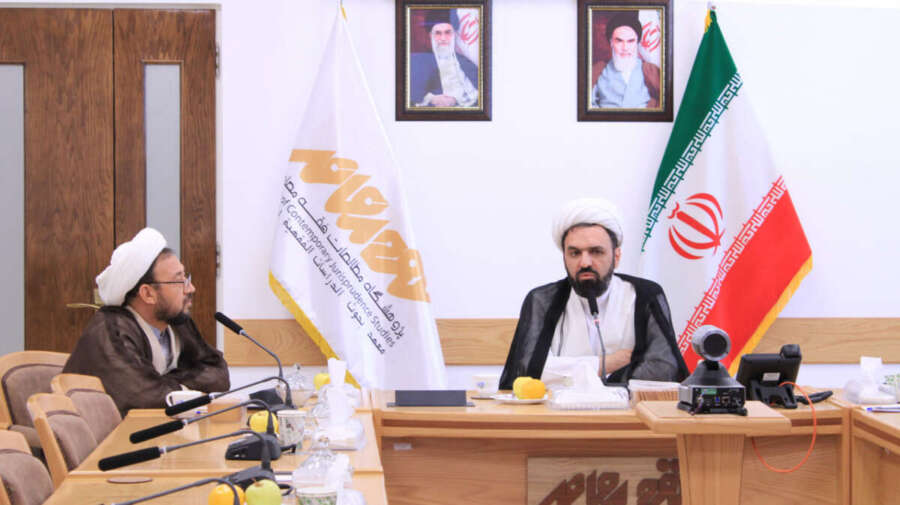Note: In the 227th session of the Research Institute for Contemporary Jurisprudence Studies, held on Wednesday, 16 Mehr 1404 (October 8, 2025), the significance of futures studies as a novel and proactive approach was highlighted. The session placed special emphasis on identifying and managing emerging jurisprudential issues. In this session, Hujjat al-Islam wal-Muslimeen Dr. Ahmad Koohi, referring to the necessity of anticipating new issues before they arise, cited technologies such as Bitcoin and biotechnology as examples of emerging jurisprudential challenges that require timely religious rulings. Dr. Ali Elahi Khorasani also stressed the importance of a more precise interaction between futures studies and jurisprudence, as well as attention to the social dimensions of religious rulings.
According to the news portal of the Research Institute for Contemporary Jurisprudence Studies, in this specialized scientific session, Hujjat al-Islam wal-Muslimeen Dr. Ahmad Koohi, a faculty member at the University of Tehran, as the presenter, examined the importance of futures studies in the science of jurisprudence and emphasized the necessity of identifying the capacities and challenges ahead. Additionally, Hujjat al-Islam wal-Muslimeen Dr. Ali Elahi Khorasani, a professor at the Mashhad Seminary and a researcher at the Foundation for Islamic Research, as the critic, analyzed and critiqued the discussions, raising key and strategic points during the session. The session was moderated by Hujjat al-Islam wal-Muslimeen Dr. Ali Sharifi, secretary of the Research Institute for Jurisprudence, Politics, and Governance at the Research Institute for Contemporary Jurisprudence Studies.
At the beginning of the session, Hujjat al-Islam wal-Muslimeen Dr. Ali Sharifi, the scientific secretary of the session, emphasized the necessity of futures studies in every discipline, stating: “Every scientific field requires futures studies, meaning that the capacities of that science must be identified, the challenges ahead anticipated, and solutions devised to address those challenges appropriately.”
Dr. Sharifi further added: “Jurisprudence is not merely about issuing religious rulings; it also aims to manage Islamic society and regulate social interactions. Therefore, the science of jurisprudence must accurately assess its current state and consider addressing emerging issues as a fundamental necessity.”
The scientific secretary of the session stressed that examining the future of jurisprudence should address critical questions such as “What new issues will jurisprudence face in the future?” and “Are the current tools sufficient to address these issues?” and should identify pathways to resolve these challenges.
During the session, Hujjat al-Islam wal-Muslimeen Dr. Ahmad Koohi presented his remarks, introducing futures studies as an important tool for identifying emerging jurisprudential issues, stating: “In traditional jurisprudence, the concept of ‘emerging issues’ exists, referring to matters that did not previously exist and now require religious rulings. However, this process typically occurs after the issue has arisen.”
He added: “My suggestion is to adopt a proactive approach, identifying the likelihood of issues before they occur and preparing for them.”
The faculty member at the University of Tehran, citing examples such as Bitcoin and biotechnologies, stated: “Delays in issuing rulings for emerging issues have imposed costs on both individuals and the jurisprudential system.”
He introduced trend analysis and environmental scanning as methods for identifying emerging issues, emphasizing: “Defining a jurisprudential issue must be done within the science of jurisprudence and cannot be delegated to other disciplines.”
Hujjat al-Islam wal-Muslimeen Koohi concluded: “Futures studies tell us that probable issues, when they become credible scenarios, gain value for jurisprudential examination, and by developing scenarios, a list of emerging issues can be compiled and transformed into jurisprudential matters.”
Hujjat al-Islam wal-Muslimeen Dr. Ali Elahi Khorasani, the critic of the session who participated online, while welcoming the interdisciplinary approach of futures studies in jurisprudence, said: “Using futures studies methods can improve the process of jurisprudential deduction, but care must be taken to avoid a reductionist approach and limiting it to common examples.”
The advanced-level professor at the Mashhad Seminary described the interaction between futures studies and jurisprudence at two main levels: “First, futures studies can elevate the subject identification in jurisprudence to a proactive recognition of subjects, and second, the data and trends from futures studies can influence the value system in jurisprudence.”
Dr. Elahi Khorasani also noted: “Current jurisprudence focuses more on issuing religious rulings and pays less attention to their social impacts, which has hindered the effective integration of futures studies into jurisprudence.”
The researcher at the Foundation for Islamic Research, critiquing the term “jurisprudence of futures studies,” stated: “I do not accept this term because futures studies is not a subject of religious rulings and cannot be recognized as a discipline for jurisprudential subject analysis.”
Hujjat al-Islam wal-Muslimeen Elahi Khorasani, referring to the challenge of changing jurisprudential paradigms, added: “Changing the jurisprudential discourse, especially in fundamental metaphors and concepts, is extremely difficult, and futures studies must approach this field with a realistic perspective.”
In response to the critiques raised, Hujjat al-Islam wal-Muslimeen Dr. Ahmad Koohi emphasized the need for gradual and non-aggressive change, stating: “Major changes often begin with small steps, and a forward-looking perspective can be a catalyst for these changes.”
The faculty member at the University of Tehran also added: “I used the term ‘jurisprudence of futures studies’ cautiously and believe more attention should be paid to the religious epistemological framework.”
The scientific session on “Futures Studies in Contemporary Jurisprudence” provided an opportunity to examine the necessity of incorporating forward-looking approaches into the field of jurisprudence and efforts to identify emerging issues ahead. With the participation of distinguished scholars, key topics, including the importance of long-term planning, the challenges of shifting jurisprudential paradigms, and the role of futures studies in advancing the science of jurisprudence, were discussed, emphasizing the importance of gradual and comprehensive change in the jurisprudential system.

